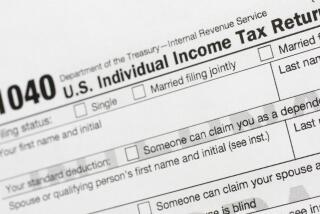IRS workers got $1.1 million in bonuses despite owing back taxes
WASHINGTON -- The IRS paid a total of about $1.1 million in bonuses over about two years to more than 1,100 employees who had been disciplined for failing to pay their own taxes, according to an inspector general’s report.
Those employees also received awards of more than 10,000 hours of extra time off and 69 faster-than-normal pay grade increases. They were among more than 2,800 IRS employees during that period who got performance awards within one year of disciplinary action, such as suspensions or written reprimands, the report found.
This is bad news for the Internal Revenue Service’s image, “which already has taken some very serious hits over the past couple of years,” said Pete Sepp, executive vice president of National Taxpayers Union.
PHOTOS: 10 most expensive cities in the world
The Treasury’s inspector general for tax administration noted that the performance awards did not violate the law.
But he said that “providing awards to employees who have been disciplined for failing to pay federal taxes appears to create a conflict with the IRS’ charge of ensuring the integrity of the system of tax administration.” The IRS’ contract with the National Treasury Employees Union says disciplinary action or investigations do not preclude an employee receiving a bonus or other performance award unless it would damage the integrity of the agency.
The inspector general’s report, released Tuesday, found that the more than two-thirds of IRS employees received performance awards in the 2011 and 2012 fiscal years.
The audit was done because new federal guidelines in 2011 required agencies to reduce spending on bonuses and other awards.
IRS spending on bonuses went down in 2012 compared to 2011.
In 2011, the IRS paid $91.6 million in bonuses and granted almost 520,000 hours of extra time off to a total of 70,500 of the agency’s approximately 104,400 employees, the report said. That amounted to awards for 67.5% of employees.
The following year, spending on cash bonuses dropped to $86.3 million and time off awards fell to about 490,000 hours. But the percentage of employees receiving performance awards increased. The agency gave awards to 67,870 of its 98,000 employees in 2012 -- or 69.3%.
Throughout that time, many employees who had been the subject of disciplinary action received performance awards.
From Oct. 1, 2010, to the end of 2012, more than 2,800 employees who had been disciplined received more than $2.8 million in cash bonuses and more than 27,000 extra hours of time off, the report said.
Those included 1,146 employees with tax problems, the report said.
The IRS has been under fire since agency officials said last year that employees improperly targeted applications from conservative groups seeking tax-exempt status.
IRS employees disciplined for failing to pay back taxes should not be denied bonuses, but the money should be diverted to pay the penalty, said Sepp of the Taxpayers Union.
“If we’re assuming that the awards are given out on true merit … then say, ‘Sorry you owe $800 on a lien and you’ve exhausted all your appeals your reward is reduced accordingly,’ ” he said.
The inspector general, however, recommended the IRS consider a policy requiring managers to consider disciplinary actions, especially those for failure to pay taxes, before deciding on bonuses and other performance awards.
The agency issued a statement saying that it already was making changes to its bonus policy.
“The IRS takes seriously our unique role as the nation’s tax administrator. We strive to protect the integrity of the tax system, and we recognize the need for proper personnel policies,” the agency said.
The IRS said it had developed a policy linking conduct to performance awards for executives and senior-level employees.
Even without such a policy, during the previous four years “the IRS has not issued awards to any executives that were subject to a disciplinary action,” the agency said.
The IRS said it is considering a similar policy for the rest of the agency’s workforce, but that would have to be negotiated with the National Treasury Employees Union.
A spokesman for the union did not immediately respond to a request for comment.
Sepp said he had broader concerns about the large percentage of IRS employees receiving bonuses. “It just doesn’t’ seem in tune with the reality of any workforce, public or private, that more than half of them would get some kind of merit-based award,” he said.







